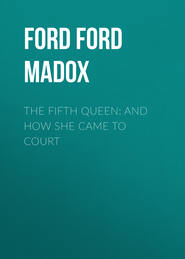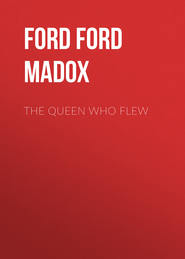По всем вопросам обращайтесь на: info@litportal.ru
(©) 2003-2025.
✖
Privy Seal: His Last Venture
Настройки чтения
Размер шрифта
Высота строк
Поля
'He was in the Tower, but stood here free,' she answered. Udal groaned.
'Then he hath blabbed. We are lost.'
She answered:
'That may be the truth. But I think it is not. For so the matter is that the cook told me.' He was taken and set in the Tower by the men of Privy Seal. Yet within ten hours came the men of the King; these took him aboard a cogger, the cogger took them to Calais, and at the gate of Calais town the King's men kicked him into the country of France, he having sworn on oath never more to tread on English soil.
Udal groaned.
'Aye! But what others were taken? What others shall be?'
She shook her head.
The report ran: a boy called Poins, a lady called Elliott, and a lady called Howard. Yet all three drank the free air before that day at nightfall.
Udal, huddled against the wall, took these blows of fate with a quiver for each. In the back of the kitchen the servers, come down from the meal of the Cleves envoy, made a great clatter with their dishes of pewter and alloy. The hostess, working with her comfortable sway of the hips, drove them gently through the door to let a silence fall; but gradually Udal's jaw closed, his eyes grew smaller, he started suddenly and the muscles of his knees regained their tension. The hostess, swishing her many petticoats beneath her, sat down again on the stool.
'Insipiens et infacetus quin sum!' the magister mused. 'Fool that I am! Wherefore see I no clue?' He hung his head; frowned; then started anew with his hand on his side.
'Wherefore shall I not read pure joy in this?' he said, 'save that Austin waileth: "Inter delicias semper aliquid saevi nos strangulat." I would be joyful – but that I fear.' Norfolk had come upon an embassy here; then assuredly Cromwell's power waned, or never had this foe of his been sent in this office of honour. The cook was cast in the Tower, but set free by the King's men; young Poins was cast too, but set free – the Lady Elliott – and the Lady Howard. What then? What then?
'Husband,' she said, 'have you naught forgotten?'
Udal, musing with his hand upon his chin, shook his head negligently.
'I keep more track of the King's leman than thou, then,' she said. 'What was it Longstaffe said of her?'
'Nay,' Udal answered, 'so turned my bowels were with jealousy that little I noted.'
'Why, you are a fine spy,' she said. And she repeated to him that Longstaffe had reported the King's commanding Katharine and Privy Seal to join hands and be friends. Udal shook his head gloomily.
'I would not have my best pupil friends with Cromwell,' he said.
'Oh, magister,' she retorted, with a first touch of scorn in her voice; 'have you, who have had so much truck with women, yet to learn that you may command a woman to be friends with a man, yet no power on earth shall make her love him. Nevertheless, well might Cromwell seek to win her love, and thence these pardons.'
Udal started forward upon his tiptoes.
'I must to London!' he cried. She smiled at him as at a child.
'You are come to be of my advice,' she said.
Udal gazed at her with a wondering patronage.
'Why, what a wench it is,' he said, and he crooked his arm around her ample waist. His face shone with pleasure. 'Angel!' he uttered; 'for Angelos is the Greek for messenger, and signifieth more especially one that bringeth good tidings.' Out of all this holus bolus of envoys, ambassadors, cooks and prisoners one thing appeared plain to view: that, for the first time, a solis ortus cardine, Cromwell had loosened his grip of some that he held. 'And if Crummock looseneth grip, Crummock's power in the land waneth.'
She looked up at him with a coy pleasure.
'Hatest Cromwell then full fell-ly?' she asked.
He put his hands upon her shoulders and solemnly regarded her.
'Woman,' he said; 'this man rideth England with seven thousand spies; these three years I have lived in terror of my life. I have had no bliss that fear hath not entered into – in very truth inter delicias semper aliquid saevi nos strangulavit.' His lugubrious tones grew higher with hatred; he raised one hand above his head and one gripped tight her fat shoulder. 'Terror hath bestridden our realm of England; no man dares to whisper his hate even to the rushes. Me! Me! Me!' he reached a pitch of high-voiced fury. 'Me! Virum doctissimum! Me, the first learned man in Britain, he did force to write a play in the vulgar tongue. Me, a master of Latin, to write in English! I had pardoned him my terror. I had pardoned him the heads of the good men he hath struck off. For that princes should inspire terror is just, and that the great ones of the earth should prey one upon the other is a thing all history giveth precedent for since the days when Sylla hunted to death Marius that sat amidst the ruins of Carthage. But that the learned should be put to shame! that good letters should be cast into the mire! History showeth no ensample of a man so vile since the Emperor Alexander removed his shadow from before the tub of Diogenes.'
'In truth,' she said, blenching a little before his fury, 'I was ever one that loved the rolling sound of your Greek and your Roman.'
'Give me my journey money,' he said, 'let me begone to England. For, if indeed the Lady Katharine hath the King's ear, much may I aid her with my counsels.'
She began to fumble in beneath her apron, and then, as if she suddenly remembered herself, she placed her finger upon her lips.
'Husband,' she said, 'I have for you a gift. How it shall value itself to you I little know, but I have before been much besought and offered high payment for that which now I offer thee. Come.'
The finger still upon her plump lips, she led him to a small door behind the chimney stack. They climbed up through cobwebs, ham, flitches of smoked beef, and darkness, and the reek of wood-smoke, until they came, high up, to a store-room in the slope of a mansard roof. Light filtered dimly between the tiles, and many bales and sacks lay upon the raftered floor like huge monsters in a huge, dim cave.
'Hearken! make no sound,' she whispered, and in the intense gloom they heard a sullen, stertorous, intermittent rumble.
'The envoy sleeps,' she said. She set her eye to a knot-hole in the planked wall. ''A sleeps!' she whispered. 'My pigling made a great thirst in him. Much wine he drank. Set your eye to the knot-hole.'
With his face glued against the rough wood, the magister could see in the large room a great fair man, in a great blue chair behind a littered table. His head hung forward, shewed only a pink bald spot in the thin hair, and brilliant red ears. A slow rumble of snoring came for a long minute, then ceased for as long.
From behind Udal's back came a crash, and he started back to see the large woman, who had overturned a chest.
'That is to test how he sleeps,' she said. 'See if he have moved.' The man, plain to see through the knot-hole, had stirred no muscle; again the heavy rumble of the snore came to them. She spoke quite loudly now. 'Why, naught shall wake him these five hours. 'A hath bolted the door; thus his secretaries shall not come to him. See now.'
She slid back a board in the wall, and Udal could see into what appeared to be a cupboard filled with a litter of papers and of parchments. Udal's heart began to beat so that he noted it there; his eyes searched hers with a glittering excitement – nevertheless a half fear of awakening the envoy kept him from speaking.
'Take them! Take them!' she nudged him with her elbow. 'Six hours ye have to read and to copy.'
'What papers are these?' he muttered, his voice thick betwixt incredulous joy and fear.
'They be the envoy's papers,' she said; 'doubtless these be his letters to the king of this land… What there may be I know not else.'
Udal's hands were in at the hole with the swift clutch of a miser visiting his treasure-chest. The woman surveyed him with pleasure and with pride in her achievement, and with the calmness of routine she fitted a bar across the door of the cupboard where it opened into the envoy's room. Udal was fumbling already with the strings of a packet, his eyes searching the superscription in the gloom.
'Six hours ye have to read and to copy,' she said happily, 'for, for six hours the poppy seed in his wine that he drank shall surely keep him snoring.' And, whilst they went again down the stairway, the papers secreted beneath the magister's gown, she explained with her pride and happiness. The aumbry was so contrived that any envoy or secretary sleeping in her best room must needs put his papers therein, since there was in the room no other chest that locked. And the King of France's chancellors allotted to all envoys her hostelry for a lodging; and once there, she made them heavy with wine and poppy seed after a receipt she had from an Egyptian, and at the appointed time the King of France's men came to read through the papers and to pay her much money and many kisses.
It was six hours later that the magister stood in his own room crushing a fillet of papers into the breast of his brown jerkin. The hostess, walking always calmly as if disorder of the mind were a thing she were a stranger to, had reclimbed the narrow stairway, replaced the papers in the envoy's cupboard and returned to her husband. She sought, mutely, for commendations, and he gave her them.
'Y'have made me the man that holds the secret of England's future,' he said. 'All England that groans beneath Cromwell awaiteth to hear how the cat jumps in Cleves. Now I know how the cat jumps in Cleves.'
She wiped the dust from her hands upon her apron.
'See that ye make good use of the knowledge,' she said. She considered for a moment whilst he ferreted amongst his clothes in the great black press beside the great white bed. 'I have long thought,' she said, 'that greatly might I be of service to a man of laws and of policies. But I have long known that to serve a man is to have little reward unless a woman tie him up in fast bonds – ' He made one of his broad gestures of negation, but she cut in upon his words: 'Aye, so it is. A gossip may serve a man how she will, but once his occasion is past he shall leave her in the ditch for the first fairer face. So I made resolve to make such a man my husband, that his being advanced might advance me. For, for sure this shall not be the last spying service I shall do thee. Many envoys more shall be lodged in this house and many more secrets ye shall learn.'
'Oh beloved Pandora!' he cried; 'opener of all secret places, caskets, aumbries, caves of the winds, thrice blessed Sibyl of the keyhole!' She nodded her head with grave contentment.
'I chose thee for thy resounding speeches,' she said. Her tranquillity and her buxom pleasantness overcame him with sudden affection. He was minded to tell her – because indeed she had made his fortunes for him – that her marriage to him did not hold good since a friar had read the rites.
'I chose thee for thy resounding speeches,' she said, 'and because art so ill-clothed i' the ribs. Give me a thin man of policies to move my bowels of compassion, say I.' For with her secret closets she might make him stand well among the princes, and with her goodly capons set grease upon his ribs, poor soul!












